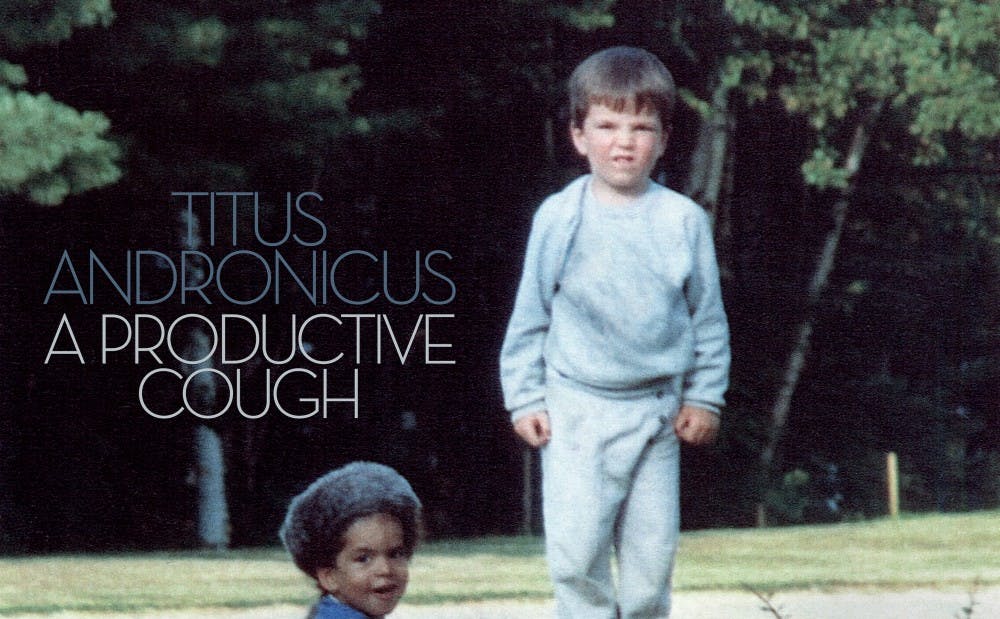Titus Andronicus are no stranger to ambition. After their 2010 release “The Monitor,” a stunning concept album that used the Civil War as a lens for personal growth, and their 2017 rock opera “The Most Lamentable Tragedy,” it’s difficult to imagine a more hefty offering. How could they continue to top themselves?
So they didn’t. The new Titus Andronicus album is severely downscaled in scope, more ballad-focused, less metaphorical ... and an interesting listen nonetheless.
“A Productive Cough” features what the press release for the album describes as a “subtler, more spacious approach” to songwriting by lead singer Patrick Stickles, including zero punk-rock tracks and a jangly, blues-esque guitar focus. On this record, the usual grandeur has been displaced by seven lyrically dense, bleak and surprisingly catchy songs that add up to an album length of 47 minutes, making the album substantially shorter than “The Monitor”’s 65 minutes and “The Most Lamentable Tragedy”’s 92 minutes.
On the first track and single “Number One (In New York),” a repeated keyboard motif gives way to eight minutes of constant lyrics, as Stickles rasps and declares himself “president of the emptiness.” As the track progresses, the guitars get louder and Stickles’ voice becomes more and more difficult to understand. I’ll blame the mixing, but I needed a lyric sheet to even understand the last two minutes of screaming. When this single was first released, I had hoped for more aggressive songs but appreciated the direction — the climax of this opener is easily one of the more aggressive songs on the track.
On the next track “Real Talk,” something very similar happens. The track certainly boils over in the last few minutes, and the bluegrass-y guitar licks are pleasant — yet it never feels like the track truly climaxes. This is my central issue with “A Productive Cough” — the songs follow a semi-predictable pattern, and they never quite build up to a deserving peak. There are several deserving lyrics on the track — Stickles’ repeated insistence, “If things are as bad as the newspaper says, we’re in for a real big war,” speaks to all of us in a way that few lyricists can — but the musical style is so different and slightly disappointing.
The second single, “Above the Bodega (Local Business),” features similar guitar tones and a more melodic sound than usual while Stickles laments how he “can't keep a secret from the guy at the store downstairs.” I’ve heard it said that those who don’t like this track probably wouldn’t like the album, and I agree. This track features the guitar sound that dominates the record and an emphasis on melody and lyrics that displaces the typical “head-banging” appeal of Titus Andronicus.
“Crass Tattoo” is the least aggressive track on the record and, bizarrely, my favorite. In a true ballad style, Stickles sings about one of his loves — the tattoo on his right hand of the punk band Crass. He sings about dedicating his right arm to “That noble cause ... to dismantle authority and nullify all laws / And construct in their vacancy a kinder, juster world,” in a poetic ode to “the piercing of the needle.” There’s no expectation of a build-up, no mountain of lyrics — it’s just Stickles’ voice and his Crass tattoo.
Given the progression of this record, the fact that “(I’m) Like A Rolling Stone” is a Bob Dylan cover with the pronouns changed to “I” makes too much sense. It’s still a complete shocker for me, and the wailing banjo guitar riff only adds to that. However, the song is undeniably catchy and Stickles’ shriek that “I’m like a rolling stone” is a charming adaptation of one of the most beloved songs in musical history.
“Home Alone” is catchy, sharp and far less lyrically involved than the previous songs. The only real line is Stickles’ insistence that “Nobody’s home, I’m home alone,” combined with “Mommy’s not home — Daddy’s not home.” The aggressiveness is welcome, but its lyrical lack of substance can make the eight-minute song feel repetitive, even if it is pulsing and intense.
The album closes with “Mass Transit Madness (Goin’ Loco’),” which embraces the style of “Above the Bodega” and the album’s dedication to ballads. The major line here — “There's a trio of trains ’twixt my work and my play” — is sung in different ways, from the screaming that Titus Andronicus is known for to the melodic mode that this record embraces. A horn riff and shredded guitar chord conclude the album, with a tambourine or two thrown in. You can hear Stickles at the end, too: “That was definitely the one!”
While the record features great lyrics and an interesting shift, “A Productive Cough” lacks the epic and aggressive feeling that made my favorite Titus Andronicus albums feel so substantial — consequently, it’s hard for me to imagine returning to this record. If a bluegrass-y and lyrical Titus is your thing, then you’ll love it. Even for those who prefer their more aggressive previous work, the lyrics are worth hearing and the new evolution in style is executed well — it’s just not for me.
Get The Chronicle straight to your inbox
Signup for our weekly newsletter. Cancel at any time.

